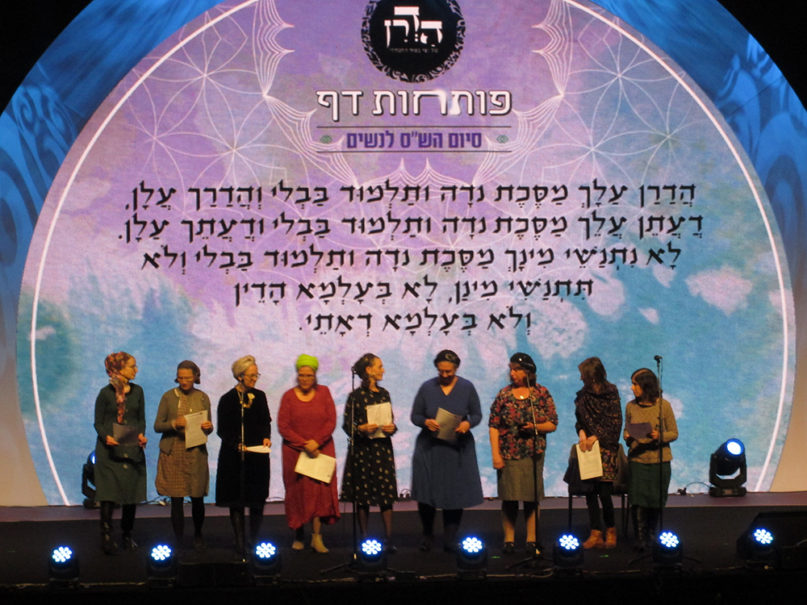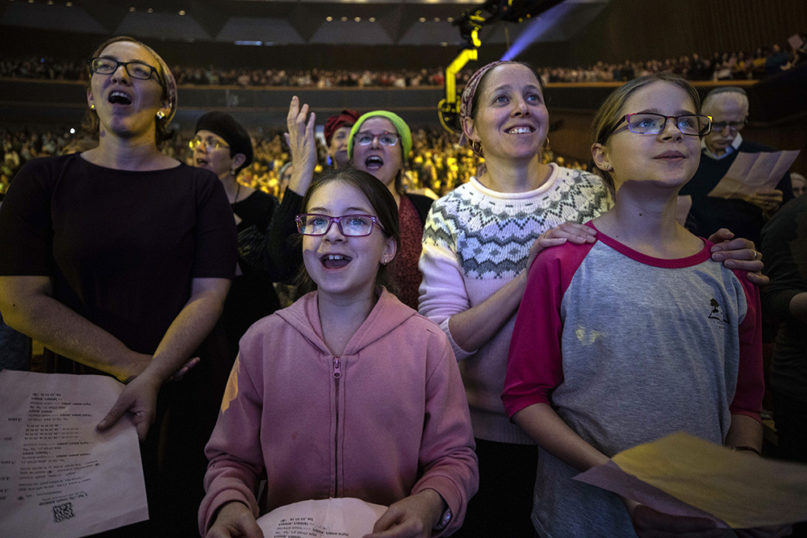JERUSALEM (RNS) — For the past seven and a half years, six days a week, Michelle Cohen Farber has been teaching one page of Talmud a day — a practice known as Daf Yomi — to a group of dedicated Orthodox Jewish women in her dining room, and a few hundred other people — the vast majority of them women — through her podcasts.
On Saturday (Jan. 4), they made it to the last page of the Talmud. Then they held a party.
Farber and other female Talmud pioneers gathered in Jerusalem on Sunday for a celebration of women’s Torah learning. It was the first public celebration of completing a cycle of Daf Yomi — known as a “siyum” — held by women in the nearly 100-year-old history of the practice, a milestone that reflects just how far some streams of Orthodoxy have come in accepting Jewish women’s scholarship.
“In our world, where women are progressing academically and setting achievements in all walks of life, it is important that in studying Torah and Jewish texts they should understand the depth of intellectual study which is the core component of our religion,” Farber told the siyum participants.
Hadran, the women’s Talmud study organization Farber co-founded, organized the event.
Thousands of people around the world watched via a livestream, while tens of thousands more expressed their excitement on social media.
The 3,300 mostly girls and women in the audience cheered Farber and other educators the way fans cheer rock stars. They also rose to their feet whenever an educator walked onstage, just as they would in the presence of a prominent male rabbi.
Despite the strides in women’s Jewish education that began in the early 20th century, it has taken nearly a century for Orthodox female Talmud scholars to attain the kind of professional recognition their male counterparts have long enjoyed.

More than 3,000 women, girls and a few men recently gathered in Jerusalem to celebrate the end of a seven-and-a-half-year period of Talmud studying Daf Yomi — a page a day of Talmud study. RNS photo by Michele Chabin
The Daf Yomi cycle was created in 1923 by the Orthodox Agudah Yisrael movement as a means of unifying world Jewry. Its creators never imagined that women would undertake it.
The women’s siyum was both energizing and emotional because study of the Talmud — a collection of texts that pertain to Jewish law and tradition — has historically been the sole purview of men, with a few exceptions.
“Talmud is theory, and theory was always reserved for men,” said Shulamit Magnus, a historian who specializes in Jewish women’s history.
“Studying the Talmud came to be the repository of status, the pinnacle,” she added. She said that in the past, Talmud study was something reserved for men who were fluent in biblical Hebrew and Aramaic and had the time and expertise to wade through complicated commentaries.
“With knowledge is power, and women weren’t going to be given the power,” Magnus said.
For centuries, Jewish girls’ education typically included the study of Jewish law as it pertains to the home and every life, but they were taught only rudimentary biblical Hebrew.
Today, many modern Orthodox schools in the U.S. and Israel teach Talmud to girls, but more stringent Orthodox institutions often do not. Post-high school seminary programs are filling the gap.
At the siyum, Malke Bina, founder and first teacher of Matan Women’s Institute for Torah Studies, recalled how, 30 years ago, she taught Talmud to a handful of women around her dining room table.
“As an educator of women’s Torah learning, I have seen an incredible growth of learning opportunities for women. We live in miraculous times,” Bina said as videos of girls learning Talmud in several countries were shown on large screens.
“The Talmud belongs to each and every one of us,” Bina proclaimed.
Addressing the crowd through a video, Rabbi Lord Jonathan Sacks, a prominent Orthodox rabbi in Britain, called the siyum an “epoch-making event.”
“This is unprecedented in scale. May you continue to live Torah. May you continue to teach Torah,” Sacks said.
Rabbi Mimi Feigelson, a senior lecturer in Rabbinics and Hassidic thought at the Schechter Rabbinical Seminary in Jerusalem, said she felt Talmud study was off-limits to her as an Orthodox girl.
“Although I had access to the Talmud, I was a stranger and a guest at best.”
Completing a Daf Yomi cycle “affirmed my place as a link in a tradition. I claimed a part of myself that had been silenced,” Feigelson said.
Sarah Bronson, an editor and writer, said it was “awe-inspiring to see how far we have come, how many learning centers were represented and how normal it is, at least in some communities, for women to the study the texts that shape our religion.”
The women’s siyum, and a large men’s siyum held in the U.S on Jan. 1, created a buzz that only seems to be growing.
Women and men who had never tried Daf Yomi have started the new cycle, which began on Sunday and will conclude on June 7, 2027.
Three days after the women’s siyum, Farber’s podcast had been downloaded more than 10,000 times.
“The event has brought thousands of new students of the Talmud to study on a daily basis. We now have high school students, seminary and college students studying alongside mothers and grandmothers, for the first time in history.
“I feel energized,” Farber said.





